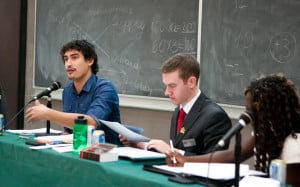Amendments to the University of Saskatchewan Students’ Union bylaw have raised the level of engagement councillors are required to have with students.
The bulk of the changes made by members at the USSU Annual General Meeting Nov. 15 were to section 82 of the bylaw. Section 82 outlines the expected duties of student councillors, which include representing their college or student group and voting on their group’s behalf at council.
At the AGM students voted to add to those duties that councillors must regularly liaise with the college or student group which they represent. For example, the two student councillors that represent the College of Arts and Science must regularly attend the Arts and Science Students’ Union’s meetings.
Additionally, councillors must now present bi-weekly reports to council including events, issues and news relevant to their constituency.
Previously, there has been time allotted at meetings for councillors to share news and events from their colleges and groups. But this time has not been regulated and updates have never been required.
This year, the union took control of the councillor election that takes place annually in the fall. In the past, the elections were conducted by the student societies and student groups.
Since the elections changed hands, many students felt that a disconnect was growing between college student societies and students’ council.

USSU members approved an amendment that requires councillors to pull up their socks and get to know students.
“They’ll be that much more engaged in their college. They will have a better understanding of what their college would want to see,” he said.
Along with regular reports on their college or student group, councillors will now be required to present the student council meeting agenda to groups within their constituency as well as attend meetings of said groups.
Councillors are to perform these duties at a minimum of a bi-weekly basis.
Brown said that in the past there has been a lack of communication between councillors and their colleges and that these additional duties are meant to create more dialogue between the two bodies.
Within the amendment to councillors’ duties, all councillors except those representing indigenous and international students may now be elected to sit on university council as student representatives for their college.
Student representatives of colleges do not have to attend university council meetings but will be able to sit on appeal boards created in the event that a student from their college is under examination for cheating or plagiarism.
Brown said that, especially in cases of alleged academic dishonesty, a rift can occur between students and administration. By allowing students to sit on appeal boards, the gap between administration and the student under investigation is better bridged, which gives the student under investigation a better chance at a fair trial.
“That was the major concern on our part and on the university’s part, and we’re completely supportive of that because there needs to be student representation on something like that.”
Two amendments were made to the bylaw so that councillors and the executive committee are now required to “protect and defend the USSU’s autonomy.”
Brown said that these amendments will help keep the union free from the influence of outside organizations so that the representation of students is not diminished.
“We need to keep the university’s student union autonomous,” Brown said.
“That is going to be the duty of both the executive and the student councillors to ensure that the union is not being controlled by the Saskatchewan government, or whatever government is in power at the time, or the university.”
—
Photo: Raisa Pezderic/The Sheaf
Leave a Reply